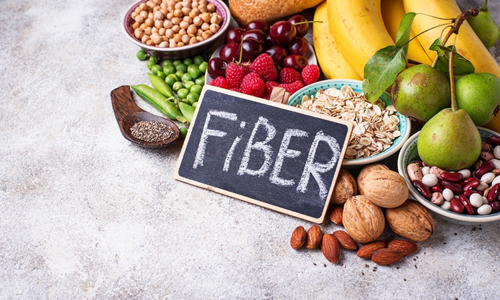Fiber is often referred to as nature’s broom, sweeping through our digestive system to help everything run smoothly. But its role in gastrointestinal (GI) health goes far beyond just keeping us regular. From supporting our gut microbiome to preventing common digestive disorders, fiber is a vital component in maintaining optimal gastrointestinal health. But what exactly is fiber, and why is it so essential? Let’s dive into the world of fiber and explore how it influences our digestive well-being.
What is Fiber?
Dietary fiber is the part of plant-based foods that our bodies can’t digest or absorb. While it may sound like a negative thing, the fact that fiber passes through our system relatively intact is exactly what makes it so beneficial.
Types of Fiber
There are two main types of fiber: soluble and insoluble. Both play crucial roles in gastrointestinal health, but they work in slightly different ways.
- Soluble Fiber: This type of fiber dissolves in water to form a gel-like substance. It helps slow down digestion, which can be beneficial for blood sugar control and cholesterol levels. Common sources include oats, apples, and carrots.
- Insoluble Fiber: This fiber doesn’t dissolve in water and adds bulk to the stool, which helps food pass more quickly through the stomach and intestines. Foods like whole wheat, nuts, and cauliflower are rich in insoluble fiber.
The Importance of Fiber for Digestive Health
Fiber is essential for healthy digestion. It adds bulk to the stool, making it easier to pass and preventing constipation. Fiber also keeps the digestive system clean by promoting regular bowel movements.
How Fiber Impacts the Gastrointestinal (GI) System
Fiber and Gut Microbiome
The gut microbiome, which consists of trillions of bacteria, plays a significant role in overall health. Fiber acts as food for the good bacteria in your gut, helping them thrive and maintain a healthy balance. A well-balanced microbiome contributes to improved digestion and reduced inflammation in the gut.
Fiber and Regular Bowel Movements
If you’ve ever been told to eat more fiber for better bowel movements, there’s a good reason. Fiber absorbs water, bulking up your stool, making it easier to pass, and promoting regularity. This helps prevent common digestive issues like constipation.
Fiber’s Role in Preventing Constipation
Constipation can cause discomfort and even lead to other health issues if not addressed. Because insoluble fiber helps to bulk up the stool, it reduces the time waste spends in your system, preventing constipation.
Soluble vs Insoluble Fiber: What’s the Difference?
While both types of fiber are beneficial, they serve slightly different purposes in the digestive system:
- Soluble Fiber slows digestion and helps absorb nutrients. It’s ideal for maintaining balanced blood sugar levels and cholesterol.
- Insoluble Fiber helps move food through the digestive system, preventing issues like constipation and promoting a healthy colon.
Health Benefits of Fiber Beyond Digestion
While fiber’s role in digestion is well-known, it offers many other health benefits.
Lowering Cholesterol
Soluble fiber binds to cholesterol in the digestive system, helping to eliminate it from the body. This can result in lower LDL cholesterol levels, which is beneficial for heart health.
Stabilizing Blood Sugar Levels
Soluble fiber slows the absorption of sugar into the bloodstream, which helps to prevent spikes in blood sugar. This is especially beneficial for individuals with diabetes or insulin resistance.
Fiber and Weight Management
Fiber-rich foods tend to be more filling, meaning you’re less likely to overeat. Because fiber takes longer to digest, it helps keep you feeling full longer, aiding in weight management.
Foods Rich in Fiber
Incorporating fiber into your diet doesn’t have to be difficult. Many common foods are excellent sources of fiber.
Fruits and Vegetables
Fresh fruits and vegetables are some of the best sources of both soluble and insoluble fiber. Apples, berries, and broccoli are particularly high in fiber.
Whole Grains
Brown rice, oats, and whole wheat bread are great ways to add insoluble fiber to your diet.
Legumes and Nuts
Beans, lentils, and almonds are also rich in fiber and provide a good balance of soluble and insoluble fiber.
How Much Fiber Do You Need Daily?
Most experts recommend that adults consume between 25 to 30 grams of fiber daily. However, the average person only eats about 15 grams per day.
How to Incorporate More Fiber into Your Diet
Adding more fiber to your diet can be as simple as choosing whole grains over refined grains or snacking on fresh fruits and vegetables.
Start Slowly
If you’re not used to eating a lot of fiber, it’s best to introduce it gradually to avoid gas or bloating.
Drink Plenty of Water
Fiber absorbs water, so it’s essential to stay hydrated to help fiber move through your digestive system effectively.
Potential Issues of a High-Fiber Diet
While fiber is beneficial, too much can lead to discomfort. Bloating, gas, and even diarrhea can occur if fiber intake is increased too quickly or without sufficient water intake.
Fiber and Common GI Disorders
Fiber and Irritable Bowel Syndrome (IBS)
For individuals with IBS, fiber can be a double-edged sword. While it may help with bowel movements, too much insoluble fiber can aggravate symptoms like bloating and gas.
Fiber and Diverticulitis
A high-fiber diet is often recommended for preventing diverticulitis, a condition where small pouches form in the colon and become inflamed or infected.
The Role of Fiber Supplements
For those who struggle to get enough fiber through diet alone, supplements like psyllium husk can be a convenient option. However, it’s always best to aim for fiber through whole foods first.
The Impact of a Low-Fiber Diet
A diet low in fiber can lead to constipation, poor digestion, and even more serious gastrointestinal disorders. Over time, a lack of fiber can increase the risk of developing conditions like diverticulitis and colorectal cancer.
Conclusion
Fiber is a vital nutrient that plays a critical role in maintaining gastrointestinal health. Whether you’re looking to improve digestion, lower cholesterol, or manage weight, fiber should be a central part of your diet. By making small changes, like incorporating more fruits, vegetables, and whole grains, you can reap the benefits of this nutrient.
FAQs
- What is the best source of dietary fiber?
Fresh fruits, vegetables, whole grains, legumes, and nuts are all excellent sources of fiber. - Can I take fiber supplements instead of eating fiber-rich foods?
While supplements can help, it’s always best to get fiber from whole foods to maximize its health benefits. - Does fiber help with weight loss?
Yes, fiber helps you feel full longer, which can prevent overeating and aid in weight management. - What happens if I don’t eat enough fiber?
A low-fiber diet can lead to constipation, digestive issues, and a higher risk of gastrointestinal disorders. - How quickly should I increase my fiber intake?
Gradually increase fiber in your diet to prevent bloating or discomfort, and make sure to drink plenty of water.

